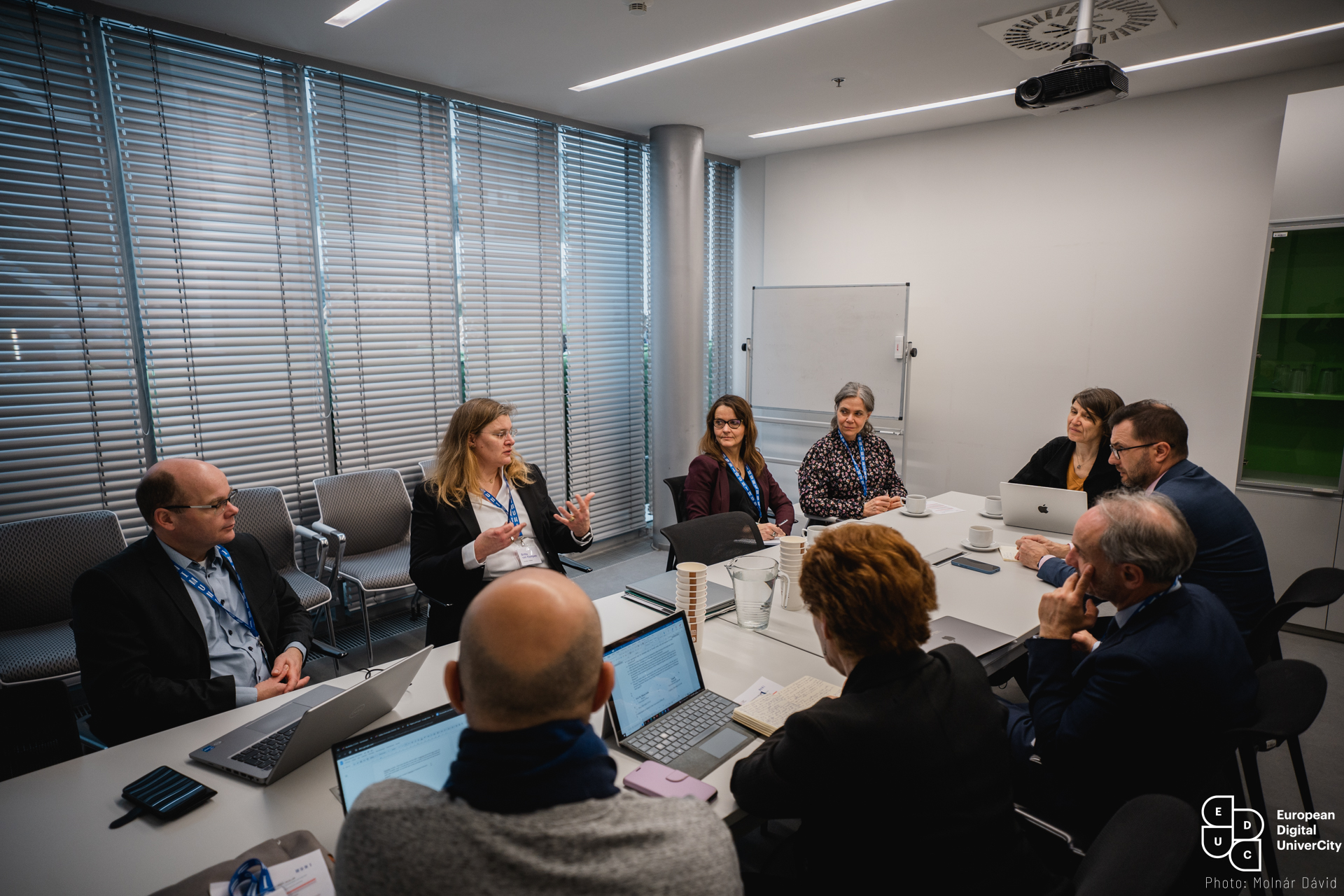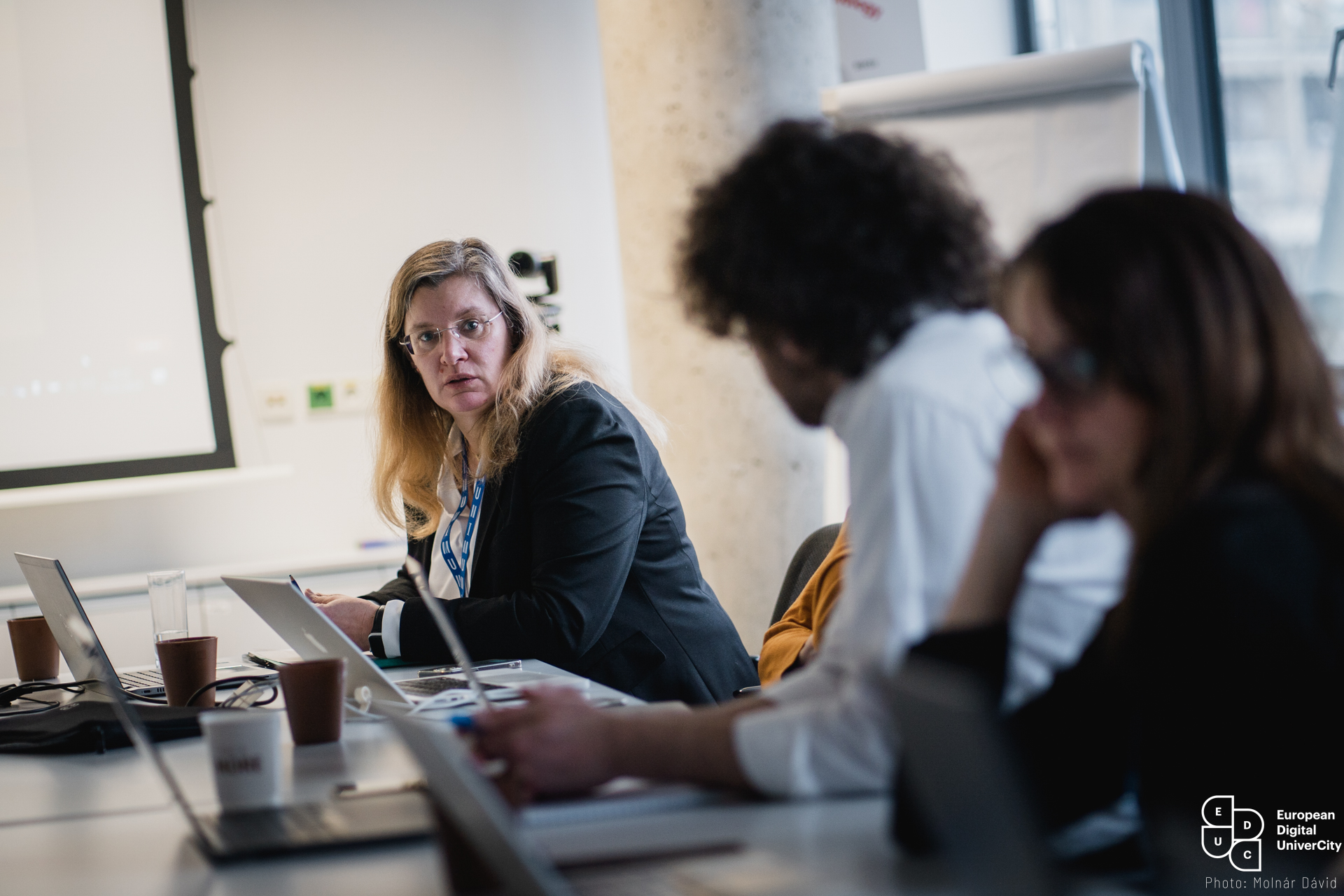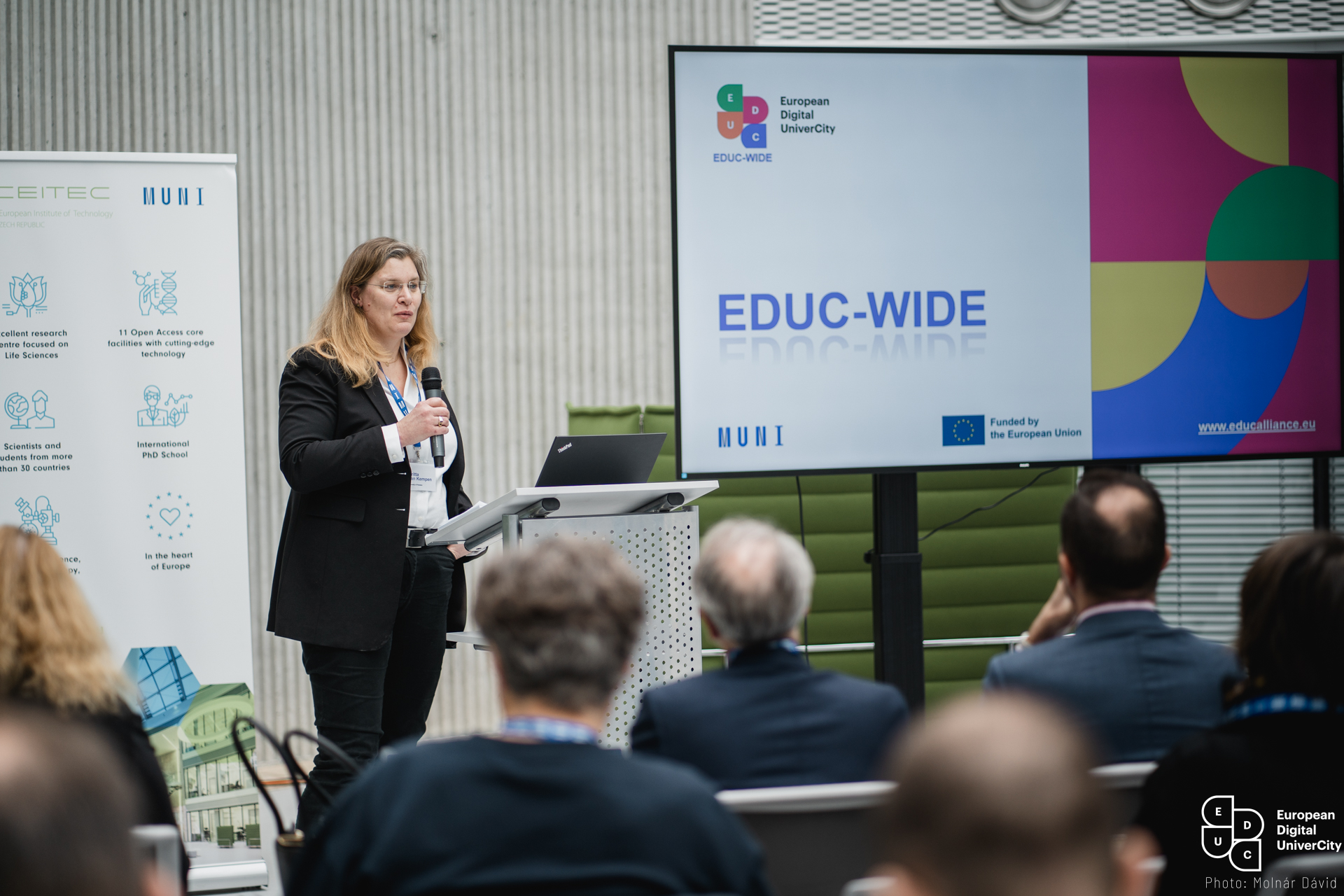
What is a farewell for one is a new start for the other: Britta van Kempen succeeds Professor Dr. Florian J. Schweigert, who retired at the beginning of the year, as head of the EDUC Alliance at the University of Potsdam. In this interview, she explains how she has settled into her new role and what we can expect for EDUC in the years to come.
Ms. van Kempen, what does the new role mean for you?
I was delighted when I was asked last year whether I would consider taking over the management of the EDUC consortium from Florian Schweigert. A positive answer came easy to me, as Europe has been very important to me since I was a student. I have been actively involved in the transformation of the German “Diplom” and “Magister” degree programs and the associated revision of curricula since the Bologna reform and have thus become familiar with many different facets of this, including administrative issues. That is why it was clear to me from the very first second that I would be happy to take on the challenges associated with EDUC.
At the same time, I was immediately aware of the responsibility and the big shoes I would be stepping into. Florian Schweigert is one of the founding fathers of EDUC; his formative role is still tangible for me. So it was of great help that I had the opportunity to accompany him to EDUC appointments since the fall of 2023. That way, we were able to organize a smooth transition that our partners also support without reservations. I would like to thank all my colleagues for the warm welcome.

You have been following and accompanying the alliance for a few years now. Do you have a personal EDUC moment? And more generally: What is it that makes EDUC special?
I actually only followed EDUC I partially and from a distance. My first direct contact with EDUC was the meeting of the Advisory Board Education at Jaume 1 University in January 2023. This is also where my personal EDUC moment took place: From the very first moment, I was fascinated by the enthusiasm with which everyone involved dedicated themselves to EDUC during these days. I immediately noticed that the atmosphere was full of intrinsic motivation. This was notable in the intense work phases, the lively exchanges during coffee breaks, and the long evenings where we discussed EDUC – alongside many other topics. Since then, I’ve had the image of a family in my mind, whose many different members stick together, but also don't shy away from discussions about different views and options. Always in a goal-oriented manner, though.
From the very first second, I was fascinated and infected by this creative drive with the definitive goal of highlighting possible paths towards a European university while tackling many obstacles in the process.

You are also the Vice President for Teaching and Studies at the UP. With this role in mind: Why is internationalization important within an alliance like EDUC?
It is my firm conviction that the idea of EDUC can be successfully conveyed via the Teaching and Studies portfolio. Fortunately, we live in a time where internationalization is perceived as an enrichment for every society and every individual. In this context, universities have a central role to play in facilitating international experiences for their students. During their studies, they should be immediately inspired, on the one hand, by the diversity they experience thanks to international contacts of our faculty and to academic reading. On the other hand, the options offered by exchange programs also play a key role. This can start with a very low-threshold, via digital formats. And that is where the D in European Digital UniverCity comes into play: EDUC is developing a wide variety of structures that allow for the implementation of digital exchange. Naturally, I hope that our students will then be able to extend the experience they have gained in this way in the form of real exchange semesters abroad.
Another momentum that makes EDUC so interesting for my portfolio is the international degree programs, where we are discovering more and more connecting lines to our European partner universities. They help students face the challenges of the world 'out there’ in an even more intensive and systematical manner. Within the alliance, we want to succeed in making international exchange even more commonplace for more degree programs by continuing to remove obstacles and instead making it a matter of course.
What are your plans for your term of office? Where do you intend to focus your energies?
I really want to ensure that the idea of EDUC is introduced into the respective partner universities and put into practice there. By that I mean that we should seek to spread our enthusiasm for EDUC among all interested parties. However, this can only succeed if we actively involve all members and affiliates of the university in these developments by demonstrating that the efforts associated with EDUC bring many benefits, even if they are not always of a monetary nature. Any transformation towards a new normal requires active willingness on the part of the faculties.
The discovery phase is now over. It must now be a matter of concern to all of us to network the tasks set out in the work packages with the faculties and university institutions. Only if we tackle them together can the tasks be dealt with in a sustainable manner. The focus here must be on engaging in discussion about the defined EDUC goals within each university. They must not be seen as imposed from the outside, but must be adapted through joint development in such a way that they produce the intended benefits.
We must also not forget that many things are already available at the universities and in some cases just need to be found. I am under the impression that the EDUC requirements are often seen as an add-on. This ignores the fact that it is often ‘just’ a matter of combining the existing solutions at the partner universities. I don't want to make it seem easier than it is: The obstacles are definitely there. However, I am convinced that EDUC is a structure of opportunities and not a burden.

You are taking over the lead in a dynamic phase: Just as your term of office starts, so does EDUC-WIDE, which replaces the EDUC-SHARE project in the alliance's research support area. What can we expect? How will the completed project be linked to the new one?
After the EDUC-WIDE kick-off, which we have just experienced in Brno, I am very confident that this project will successfully tie into the completed EDUC-SHARE project. Scientific collaboration with goals such as open science, the use of shared infrastructures, or research funding, especially at the beginning of a career, are important and common topics. However, the goal now is to look at them systematically in a European context and learn from each other. This is why we also need to enter into discussions with stakeholders in faculties and institutions within the partner universities in order to integrate the many existing ideas and structures into EDUC-WIDE – and to be able to develop and implement new ideas in the process.
Where do you see EDUC in five or ten years' time?
That's a question I find difficult to answer without a crystal ball. If I think in phases, I could deduce that after the four-year discovery phase impacted by COVID-19, we will now enter the exciting phase of implementation. Now it will be a matter of translating our considerations into the reality of universities. We will definitely need the three remaining years of the current funding phase for this. This is because the associated transformation process will also raise structural questions that will affect the engine room of each and every partner university. That is why I have very high hopes for a possible two-year extension that has been put on the table. If we succeed in this implementation phase, in ten years we could have achieved the goal of a European university as formulated by French President Emmanuel Macron.
However, I would also like to emphasize that I appreciate the decentralized nature very much, both in the microcosm of the University of Potsdam and in the macrocosm of EDUC. I don't want us to fall into the trap of standardization. Because the strength of most constructions, including EDUC, lies in their diversity. The partners have not only found each other because they have a lot in common; this is undoubtedly an important foundation. They have also recognized that they have a lot to offer each other thanks to their complementarity. And we should also focus on that as we continue to shape the future of EDUC.
The questions were asked by Luisa Agrofylax.